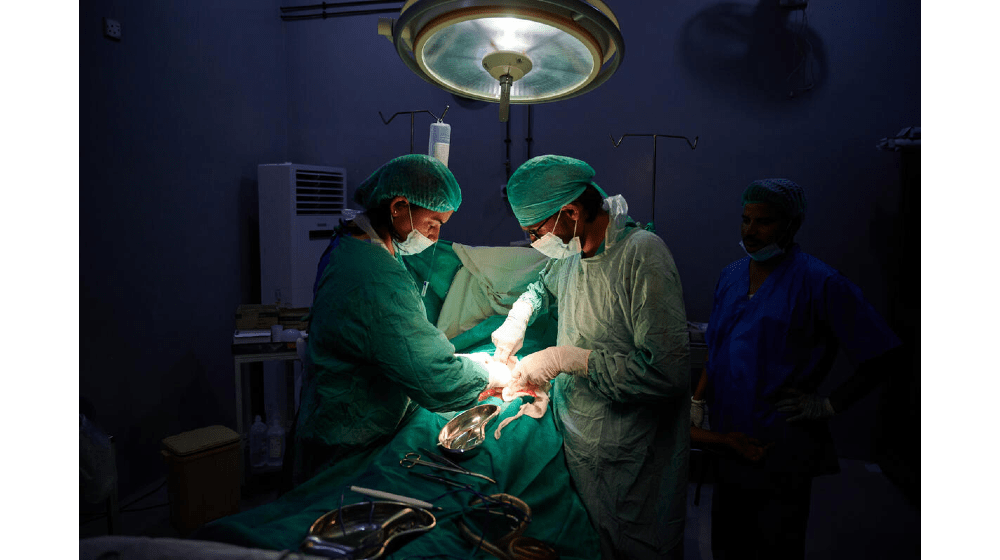Nestled in the heart of Shoust village within the picturesque Upper Yarkhun Valley of Chitral in Khyber Pakhtunkhwa, Pakistan, the Aga Khan Health Center stands as a ray of hope for individuals like Khadija and other young mothers residing in the region. With state-of-the-art family planning amenities and a cutting-edge ultrasound machine generously provided by UNFPA Pakistan, the center endeavors to not only enhance maternal health outcomes but also alleviate the financial strain on families such as Khadija's.
By eliminating the need for costly travel and facilitating negotiations with local healthcare providers to defer payments until access to funds is secured, the center strives to empower families and uplift the overall well-being of the community.
Khadija, a young woman with a lively smile and hopeful eyes, lives in Shoust. Like many other young mothers of the village, her days are filled with the toil of subsistence-level agro-pastoral activities against the region's harsh weather conditions. People partly rely on meagre earnings from migratory labour work, venturing to cities in winter and returning to the villages in spring with whatever cash is left out of city life expenses.
Similar to numerous women in the vicinity, Khadija grapples with the challenge of seeking enhanced health facilities for a secure delivery and safeguarding the well-being of her children. The nearest hospital, with modern sexual and reproductive health (SRH) facilities including family planning (FP), is located 60 km away in the district centre, involving a perilous journey through a mountainous road that costs 3,000 Pakistan rupees per person on public transport. The actual check-up and medicine expenses are additional burdens on families already struggling with meagre incomes.
“Fearing the long, rough, and bumpy road to the hospital, I often remained worried about the possibility of giving birth prematurely on the treacherous journey that takes six hours. Here in the village, we often hear the tales of complications during childbirth and children being born with disabilities. During my second pregnancy, seeking reassurance about the safety of my child, I went through ultrasound examinations twice in the far medical centre, and my poor husband had to struggle to afford it despite the significant deterrent of high travel costs,” Khadija paused in the narration of her story, looking towards her husband with compassion.
Learning about the ultrasound facility in Aga Khan Health Center, Upper Yarkhun Valley, Khadija discovered a new ray of hope. Thanks to the collaboration between UNFPA Pakistan and Aga Khan Health Service Pakistan, the modern centre offers essential family planning and reproductive health services to the community. UNFPA's capacity-building programs have equipped healthcare providers with training in family planning techniques and the operation of ultrasound machines.
The “Sihaat Mand Khaandaan (SMK) Project: Healthy Families for Pakistan Through Accelerating Sexual Reproductive Health (SRH) and Family Planning (FP) Services (2020-2024)” is being executed as part of an initiative with the goal of improving the reproductive health and rights of women, adolescents, and youth in regions characterized by insufficient reproductive health indicators. This project, generously funded by Global Affairs Canada, seeks to empower communities to exercise their reproductive rights free from coercion, discrimination, or violence.
Anticipating the arrival of her third child just a year after the birth of her second baby girl, Khadija hesitated to express her concerns to the Lady Health Visitor (LHV) at the center. The LHV consistently advocates for a minimum three-year gap between children. Yet, the LHV's compassionate and understanding demeanor, rooted in her identity as a daughter of the village, quickly reassured Khadija. With patience, the LHV delved into the intricacies of ultrasound and family planning services, addressing Khadija's fears and offering the support she required.
In the absence of a steady cash income, Khadija and fellow community members find themselves occasionally in the fortunate position to postpone payments for SRH services, including FP, for a brief period when funds are scarce. This considerate practice, extended by Lady Health Visitors (LHVs), proves invaluable in enabling local women to access essential healthcare services promptly. Reflecting on this, an LHV from the Aga Khan Health Center in Shoust, Upper Yarkhun, shared, “Most women settle their dues within days when their husbands receive payment for their labor, while for a few others, we extend our understanding, waiting for months until their husbands return from work in down Pakistan during the spring season.”
As Khadija continues her journey through pregnancy, she finds solace in the village health centre staff's familiar faces and caring hands. The ultrasound examinations in her village save her the arduous travel and unbearable cost and provide a sense of security and trust in the community's healthcare system.
Khadija's story is just one among many other women in the Upper Yarkhun Valley, where the collaboration between UNFPA Pakistan, Aga Khan Health Centers, and government facilities is making a tangible difference in the lives of women and families. Through these efforts, the community is moving towards better reproductive health, safer deliveries, and healthier futures for their children. For local young women, speaking the language of FP and RH issues doesn't seem to be the language of shame, thanks to the ways local health centre staff engage local men and women with reproductive health and family planning issues.


